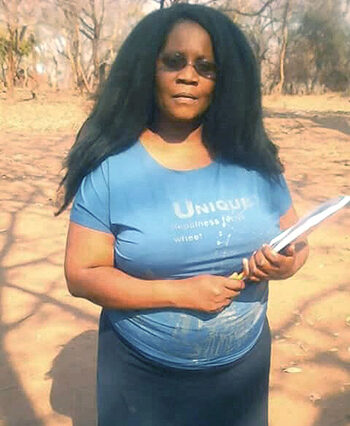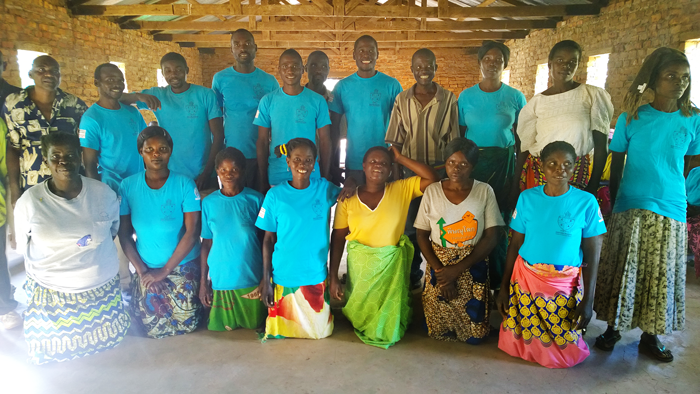ABM Archive Website
THIS WEBSITE CONTAINS ARCHIVE MATERIALS FOR HISTORICAL REFERENCE ONLY
For up-to-date information, including our latest appeals, news, and resources, please visit our current website.
Stories from Zambia: Integrated Gender Initiative
 |
| Diocesan Gender Coordinator Esther Mwanza |
Following on from the earlier stories about the village of Mzenje in the Eastern Diocese of Zambia, more stories emerge about the changes that the Integrated Gender Program has brought about to the people living there.
The Diocesan Gender Coordinator Mrs. Esther Mwanza tells us:
“I never thought I would see a day like this in Mzenje where people would come out so strongly and together to challenge the cultural practices that acts as a barrier to the women and girls accessing their rights.
In one year I have observed a lot of changes behavioral wise, women and men are showing signs of working together, Community members on their own have become whistle blowers each time they come across cases of abuse or violence. They quickly alert the office or Parish Priest or the Senior Headman for further action.
So far More than 64 cases of Gender Based Violence (GBV) have been reported through Mzenje counselling Centre. Some of the successful cases included those of 12 girls rescued from child marriages with the help of the Police Victims Support Unit. The parents to the girls were counseled and the 7 girls have since gone back to school. What contributed to these changes was the arrest of two of the girls’ parents for marrying off their teenage daughter. This I must say was a good lesson for those who had plans to marry off their underage daughters.
For example now parents come privately to consult whether or not to have their daughters married and /or ascertain the age of their daughter for fear of being arrested by the police. It is interesting to note that child marriages have reduced tremendously in Mzenje and this is an indication that the efforts of the Zambia Anglican Church through Zambia Anglican Council Outreach Programme with support from Anglican Board of Mission in the fight against GBV are yielding results.”
Give generously to ABM’s 2018 Tax Appeal so that communities like Mzenge might be transformed through greater gender equality.
MORE STORIES OF HOPE
 |
| Through the Gender Integration Project, women’s lives in Mzenje are being transformed beyond traditional and cultural roles.© Zambia Anglican Council. |
There was a belief that if a man was not beating his wife,
then he did not love her….A story of hope.
Introduction written by Dr Julianne Stewart
Each March ABM, along with many organisations and individuals around the world, celebrates International Women’s Day. As part of this annual focus on women, many parishes also celebrate the World Day of Prayer (WDP), which is organized by women (and some men!) to focus on the place of women in a particular part of the world. This year the Day of Prayer honed in on the tiny Caribbean nation of Suriname. I was privileged this year to attend the WDP church service organized by my own rural parish of St John’s, Stroud in Newcastle diocese. And I’m sure many of you attended similar services.
The purpose of celebrating such days is to get us to stop for a moment and think about the highlighted issue, whether that is the lives of girls and women living in poverty, or whether that be about the plight of the millions of people worldwide who don’t have access to clean water, or a hygienic toilet.
I currently work for ABM as its Africa Programs Coordinator, and part of my role is to work with the Anglican Church in Zambia, Central Africa, supporting their Gender Integration Project. Helping local communities to strive for gender equality, and for the empowerment of women and girls, is a high priority for the church there. There are many calls on us as Christians to stop, listen, think, pray and act on the numerous instances of injustice around the world, and I would ask you to do just that as you read this story of hope from one of ABM’s partners.
Mzenje is a community situated in Petauke district under Eastern Diocese of Zambia. Mzenje is located in Nyampande Chiefdom about 35 km away from Petauke town. The community is occupied by the Nsenga-speaking people who are matrilineal by descent with high male dominance. The men folks make all the decisions in a home and women can never argue or disobey. There was a belief that if a man was not beating the wife then he did not love her nor care for her. Child marriages in Mzenje were extensive and girl children were not given an opportunity to go to school. Child marriages were seen as a way of maintaining respect in a family, source of wealth and also were viewed as preventive measure to pregnancy outside marriage. More so the men had the deciding power over their daughters’ marriages that can be as young as 13 years old. Boy children on the other hand were considered more important and thus would be allowed to go to school to know how to read and write, but nothing further than that. When they come back from school they spent most of time herding cattle. Mzenje has high levels of illiteracy for both males and females. This is because very few attained an education, especially the girl child. All these things were done because the community had for a long time been living in their own ignorant world.
With support from Anglican Board of Mission (ABM) Australia through Zambia Anglican Council Outreach Programme, on the 4th March 2016 Mzenje community saw the ‘rising of the sun’. This was the beginning of a new journey of transformation with the introduction of the Gender Integration Project. Both women and men in the community were very happy to have a project that would help them change for the better.
 |
| The Mzenge Gender Action Drama Group. © Julianne Stewart/ABM 2017. |
It’s a hot afternoon in a village in Eastern Zambia. The Anglican Church hall begins to fill with people. All is silent as a group of young people wearing distinctive light blue tee-shirts enters, and the play begins.
Some of the characters are obviously caricatures – a perpetually drunken husband who alternates between throwing his weight around in his family, to going on drunken binges, to sleeping through the days while his wife and children work their small family farm.
The story line is a moral one, with the husband convincing his wife to sell their pubescent daughter to a man he has met while drinking… but his virtuous young son joins with like-minded local people to prevent the marriage taking place, and the story comes to a climax as the father is threatened with arrest by district police.
The police and the son convince the father that the family will be much better off if the young girl is allowed to finish her schooling, and if the father starts to do his share of the farm work, taking some of the burden off his wife.
It all ends well with the father abandoning the drink for an honest day’s work, and his wife having more time to spend on value-adding their farm produce. The audience is clearly entertained, but an unmistakable message is being communicated. As one audience member says, “Early child marriage is violence against girl children. We have learnt that children shouldn’t marry at 12 or 13. If they do this, we are oppressing them.”
The group in tee-shirts is the Mzenje Gender Action Drama Group, in Zambia’s Petauke District. Assisted by ABM’s partner, Zambia Anglican Council, they are using drama as one of several tools to change mindsets about the roles of men and women in communities, and the value of women’s empowerment to the flourishing of all.
< Back



